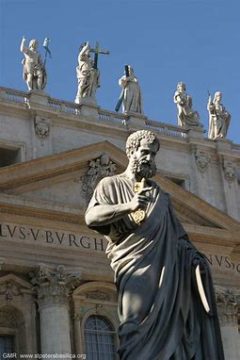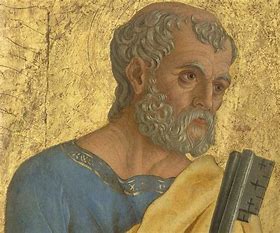As we anticipate the Twenty-first Sunday of Ordinary Time Fr. Paul Gallagher, OFM offers a Scriptural Reflection. This content is edited by Franciscan Sister of Christian Charity Sister Anne Marie Lom and Joe Thiel. The excerpts from the Sunday readings are prepared by Joe Thiel. To read or download the complete pdf with excerpts for your prayer, please click here: Franciscan Gospel Reflection August 22 2021 Excerpts are from the Lectionary for Mass for Use in the Dioceses of the United States of America, second typical edition © 2001, 1998, 1997, 1986, 1970 Confraternity of Christian Doctrine, Inc., Washington, DC. Used with permission. All rights reserved. No portion of this text may be reproduced by any means without permission in writing from the copyright owner.
John 6:60-69
Then many of his disciples who were listening said, “This saying is hard; who can accept it?” Since Jesus knew that his disciples were murmuring about this, he said to them, “Does this shock you? What if you were to see the Son of Man ascending to where he was before? It is the spirit that gives life, while the flesh is of no avail. The words I have spoken to you are spirit and life. But there are some of you who do not believe.” Jesus knew from the beginning the ones who would not believe and the one who would betray him. And he said, “For this reason I have told you that no one can come to me unless it is granted him by my Father.” As a result of this, many of his disciples returned to their former way of life and no longer accompanied him.
Jesus then said to the Twelve, “Do you also want to leave?” Simon Peter answered him, “Master, to whom shall we go? You have the words of eternal life. We have come to believe and are convinced that you are the Holy One of God.”
Background:
Usually, this Sunday would have been the fifth week that the gospel text was taken from the sixth chapter of John’s Gospel. The celebration of the feast of the Assumption of Mary last Sunday created an unusual break in the liturgical cycle. The sixth chapter of John begins with the crowd seeking Jesus after he had crossed the Sea of Galilee. Jesus responded to the crowd in two ways: by feeding them with the barley loaves and fish, and with his teaching. Within Jesus’ teaching they heard him claim that he was the bread of life come down from heaven, and all that that implied. But his teaching proved to be too much for them. “The Jews murmured about him because he said, ‘I am the bread that came down from heaven’ and they said, ‘Is this not Jesus, the son of Joseph?… Then how can he say, ‘I have come down from heaven?’ (John 6:41-42)
The last section of the chapter focuses on the disciples, Jesus’ own followers, and their response to his teaching. They find it hard to accept Jesus’ claim that he is the Son of Man who has come down from heaven. Jesus’ response to their difficulty is not to soften his claim or to try to make his teaching more acceptable. Rather, he confronts them with another question. If they have trouble believing that he has come down from heaven, what would they think if they saw him ascend up into heaven? It is a hypothetical question. Jesus is also suggesting that “seeing is not the same as believing.” The disciples have seen Jesus do some extraordinary things, yet they are having difficulty in believing what he is teaching them. Faith is not natural, nor does it come easily.
Jesus is not indifferent to the departure of some of his disciples. He turns to the twelve and asks them what they are going to do. He asks them about their intentions. He leaves them free to decide for themselves, not asking them to stay nor saying that they have permission to leave. Instead, he asks them what they want to do. Peter, the spokesperson, makes three statements that seem to move toward a deeper faith and a deeper commitment to following Jesus.
- “…To whom else shall we go?”
- “You have the words of eternal life.”
- “We have come to believe and are convinced that you are the Holy One of God.” (John 6:68-69)
Even though these three statements follow one after the other, it took the early Christians more than a generation to come to this understanding of Jesus that John recorded in his sixth chapter.
Reflection Questions:
- Are there things about the Catholic Church about which you would like to say, “These things are hard to accept?”
- How would it help you if there was someone in the Church to actually say that to?
- For you, are the hardest parts about being Catholic matters of faith or of practice?
- For you, what are the best parts of the Catholic Faith and tradition?
- If Jesus would turn to you and ask, “Why do you stay?” how would you respond?
- Can you talk to God now about how you see yourself as being a faithful disciple, and how you would like it to be (if you are not living the discipleship that you would like to now)?



